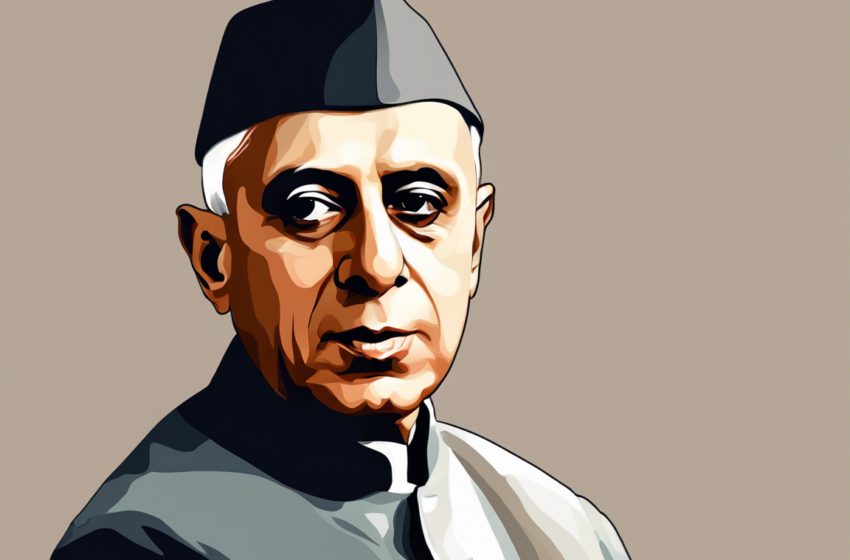Remembering Pandit Jawaharlal Nehru: A Tribute to India’s First Prime Minister

Introduction
As a visionary leader, statesman, and architect of modern India, Pandit Jawaharlal Nehru holds a special place in the hearts of millions. Serving as the country’s first Prime Minister from its independence in 1947 until his passing in 1964, Nehru played a pivotal role in shaping the nation’s destiny. His contributions to building a democratic, secular, and socialist society have left an indelible mark on India’s history and continue to inspire generations of Indians.
Early Life and Education
Born on November 14, 1889, in Allahabad, British India, Jawaharlal Nehru hailed from a distinguished family. His father, Motilal Nehru, was a prominent lawyer and politician, while his mother, Swarup Rani Nehru, came from a lineage of Kashmiri Brahmins. Nehru received his early education at home under private tutors before attending Harrow School in England and later Trinity College, Cambridge.
Political Influence and Independence Struggle
Nehru’s political awakening came during his time in England, where he was exposed to socialist and nationalist ideas. Upon returning to India, he joined the Indian National Congress and became a protege of Mahatma Gandhi. Nehru’s commitment to the cause of Indian independence saw him at the forefront of the freedom struggle. He participated in civil disobedience movements, faced numerous imprisonments, and emerged as one of the leading voices of the independence movement.
Role as India’s First Prime Minister
After India gained independence on August 15, 1947, Nehru assumed office as the country’s first Prime Minister. His tenure was marked by a commitment to democratic principles, secularism, and social justice. Nehru laid the foundations of India’s parliamentary democracy, emphasizing the importance of pluralism and inclusive development. He also championed a non-aligned foreign policy, advocating for global peace and cooperation.
Achievements and Legacy
Nehru’s tenure as Prime Minister saw significant achievements in nation-building and development. He prioritized education, healthcare, and industrialization, laying the groundwork for India’s future progress. The establishment of institutions like the IITs and AIIMS, as well as the initiation of the Five-Year Plans, underscore Nehru’s emphasis on economic growth and social welfare. His vision of a modern, progressive India continues to shape the country’s aspirations and policies.
Challenges and Criticisms
Despite his many contributions, Nehru faced criticism on various fronts. His approach to economic planning, industrial policy, and foreign relations drew mixed reactions. The Indo-China war of 1962 and the Kashmir conflict were significant challenges that Nehru grappled with during his tenure. Nevertheless, his leadership during trying times and commitment to democratic values earned him respect both at home and abroad.
Personal Life and Influence
Beyond politics, Nehru was also a prolific writer and thinker. His books, including “The Discovery of India” and “Glimpses of World History,” reflect his intellectual depth and passion for understanding the world. Nehru’s charisma, charm, and elegant oratory endeared him to the masses, earning him the title of “Chacha Nehru” (Uncle Nehru) among children. His legacy as a nation-builder and institution-builder resonates across India’s social, political, and cultural fabric.
Conclusion
In conclusion, Pandit Jawaharlal Nehru’s life and legacy serve as a beacon of inspiration for generations of Indians. His role in shaping India’s democratic ethos, fostering a spirit of scientific inquiry, and upholding the principles of social justice remains unparalleled. As we remember Nehru’s towering presence on the world stage, we are reminded of his enduring belief in India’s potential as a vibrant, multicultural democracy. The ideals he espoused and the institutions he built continue to guide India’s journey towards progress and prosperity.
Frequently Asked Questions (FAQs)
- What were Jawaharlal Nehru’s major contributions to India’s independence movement?
-
Nehru played a crucial role in articulating the vision of a free and independent India. He was at the forefront of the civil disobedience movements and played a key role in negotiating with the British colonial authorities.
-
What was Nehru’s vision for India’s development post-independence?
-
Nehru emphasized the need for economic growth, social justice, and scientific progress. He believed in state-led industrialization and the importance of investing in education and healthcare.
-
How did Nehru contribute to the field of education in India?
-
Nehru was instrumental in setting up premier educational institutions like the Indian Institutes of Technology (IITs) and the All India Institute of Medical Sciences (AIIMS). He believed in the transformative power of education for nation-building.
-
What was Nehru’s stance on foreign policy and international relations?
-
Nehru laid the foundation for India’s non-aligned foreign policy, advocating for peace, cooperation, and solidarity among nations. He played a key role in the Bandung Conference and the formation of the Non-Aligned Movement.
-
How is Jawaharlal Nehru remembered in India today?
- Nehru is fondly remembered as a visionary leader, institution-builder, and statesman. His contributions to nation-building, democracy, and social welfare continue to inspire successive generations of Indians.